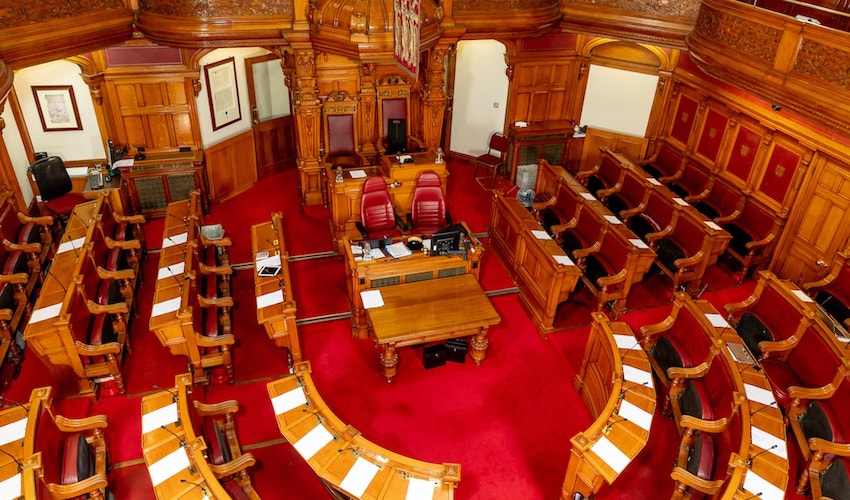

The government has opened 'Pandora's box' through its many consultations, unleashing a set of answers it may not want - or be ready - to hear.
That's the opinion of the secretive business guru known only as 'The Fool', who shared his thoughts in his latest column for Connect Magazine...
"81% is a pretty big number in percentage terms.
If you’re running a company with a profit margin of 81%, you’re probably doing something right. Or your competition is doing something disastrously wrong. Or you’re a monopoly. The support of 81% of one’s board might even render a football manager relatively comfortable about his tenure for the forthcoming week.
If you’re a politician, winning a vote or election with an 81% margin would be as near as damn it a walkover, and would be a fair indication that the voters had wholeheartedly swallowed whatever nonsense it was you had to promise to win their endorsement. 50.01% is a majority. 81% is your proverbial streets ahead.

Pictured: "Winning a vote or election with an 81% margin would be as near as damn it a walkover."
In a roundabout manner, that brings us to another ‘streets ahead’ outcome, that of the percentage of respondents to a recent States survey who were against reducing speed limits in the parish of St Saviour.
That’s right, a startling 81% of people felt that the move would be unnecessary. 70% did, however, accept that traffic-calming measures near schools at appropriate times were justified.
Aside from learning that the public might actually indulge in sensible behaviour without the need for legal strictures, one can’t help but get the feeling that the States, like the Conservative Party and the BREXIT referendum, have inadvertently asked a question they really didn’t want the answer to.

Pictured: Did the Conservative party really want to hear what people thought about Brexit?
The Infrastructure Minister has confirmed that his department are, “…analysing the responses to the survey and discussions will be held with the St. Saviour Roads Committee.”
I’ve saved him the job and analysed the results for him. 4/5ths, 81%, four in every five people asked, thought changing the speed limits was a waste of the States time and our money.
The ‘discussion’ with the roads committee therefore only really needs to consist of three words: ‘chance’ ‘a’ and ‘not’. The outcome will, however, be an interesting test of how our representatives interpret democracy, given the overwhelming weight of public opinion expressed by those who bothered to respond.

Pictured: Switzerland allows referendums at regional and federal levels on a quarterly basis.
From the States perspective, this new spirit of consultation may have opened a Pandora’s box that can’t be closed.
Assuming that the democratic will of the participants is implemented and we are saved from further unnecessary pettifogging intrusion; imagine the impact on decisions, which might affect our lives, if we start to get public consultations on important questions?
Switzerland, Europe’s paragon of direct democracy, allows referendums at regional and federal levels on a quarterly basis. When citizens disagree with a parliamentary decision, and are able to gather 50,000 signatures (around 0.6% of the population) within a certain time-frame, the act is submitted to a vote of the people, and will only come into force if accepted by a majority of those who vote.
The greatest impact of these referendums is that the people retain ultimate control of what happens in their country BETWEEN elections, not just at election times when they choose to replace any politicians who haven’t been playing ball.
Pictured: "The Peoples’ Republic of St. Mary’s" introduced ‘traffic calming’ measures a few years ago.
Had the island’s drivers, who have to navigate the automobile obstacle course that is the village’s roads, been given a vote on the Peoples’ Republic of St. Mary’s ‘traffic calming’ measures introduced a number of years ago, one wonders whether all that money might not have found its way to that other communist state for their granite?
An admittedly less than scientific straw poll of my mates down the pub would seem to indicate that 81% might be understating the support for an environmental cleansing of bollards, passive aggressive smiley signage and raised tarmac which greets visitors transiting westward to God’s own parish.
This of course is redolent of the ongoing battle to oust the Constables from their traditional role in the States, seeking to remove their ability to legislate on island-wide matters, and to restrict their impact to parish issues.

Pictured: Should Constables be able to legislate on island-wide matters?
At the last census in 2011, the population of St. Clement was 9,221. On the Swiss democratic model, that would require only 55 people to sign a petition to force a referendum on a change in the Parish’s speed limits. Of the 385 who responded to the recent consultation, 310 have already come out against any change.
In the rotten borough of St. Mary (population in 2011 of 1,752) you’d need only 10 people to raise an objection to get a vote on changing the limits. Which, coincidentally, are about the number of people who were able to railroad the Constable into inconveniencing 50,000 other road users.
According to history, Saint Clement was Pope from AD88 to AD97, but was martyred by being cast into the sea tied to an anchor for attempting to help prisoners, who subsequently converted to his Christian views.
Now there’s irony for you."
The views expressed in this piece are those of the author, and not of Bailiwick Express. Read the Fool and more analysis in Connect Magazine by clicking here.
Comments
Comments on this story express the views of the commentator only, not Bailiwick Publishing. We are unable to guarantee the accuracy of any of those comments.